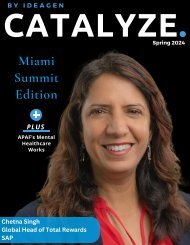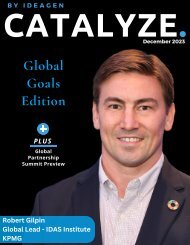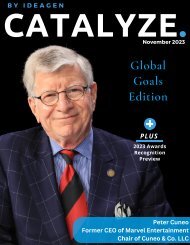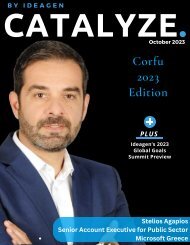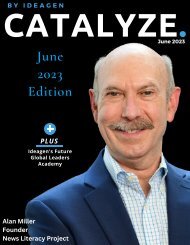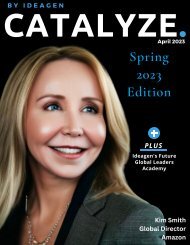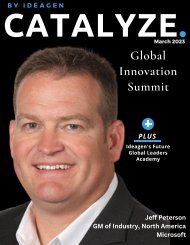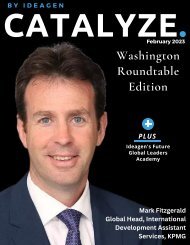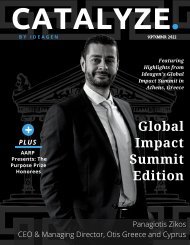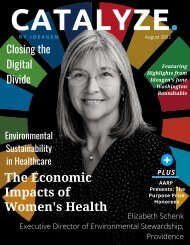Ideagen Global - Catalyze Magazine, January 2023
With Ideagen's extensive member network and influential platform, Catalyze Magazine serves as an aggregate for all the content, events, articles, and collaboration that we do. It is a monthly magazine where you will find transcriptions from Ideagen events, content, articles, and information surrounding how we are completing our mission. With this magazine, we want to highlight the nature of cross-sector collaboration and how we infuse it into our daily mission on a global scale. Ideagen's monthly Catalyze Magazine is back in 2023 with our January edition. Inside, view conversations from our Global Leadership Summit, dedicated to the late friend of Ideagen, Steven J Tingus. This months covers features speakers from the 2023 Global Leadership Summit: Gretchen O'Hara, Dr. Sanjay Rishi, Graham Macmillan, Amir Dossal, Kevin Donnellan, Jean Accius, and Kristen Hicks.
With Ideagen's extensive member network and influential platform, Catalyze Magazine serves as an aggregate for all the content, events, articles, and collaboration that we do. It is a monthly magazine where you will find transcriptions from Ideagen events, content, articles, and information surrounding how we are completing our mission. With this magazine, we want to highlight the nature of cross-sector collaboration and how we infuse it into our daily mission on a global scale.
Ideagen's monthly Catalyze Magazine is back in 2023 with our January edition. Inside, view conversations from our Global Leadership Summit, dedicated to the late friend of Ideagen, Steven J Tingus.
This months covers features speakers from the 2023 Global Leadership Summit: Gretchen O'Hara, Dr. Sanjay Rishi, Graham Macmillan, Amir Dossal, Kevin Donnellan, Jean Accius, and Kristen Hicks.
You also want an ePaper? Increase the reach of your titles
YUMPU automatically turns print PDFs into web optimized ePapers that Google loves.
METRICS IN<br />
CAREGIVING WITH<br />
AARP<br />
By: Jean Accius<br />
George Sifakis:<br />
Let's talk about moments in care<br />
caregiving. Caregiving is a critical<br />
element of what you do at AARP,<br />
and I'd love to hear from you. Why<br />
is caregiving so vital for those that<br />
need it at this moment in our<br />
nation's history and globally?<br />
Jean Accius:<br />
We know that around the country,<br />
people are aging and living longer.<br />
In the US, we have over 48 million<br />
family caregivers who provide care<br />
each and every day. These are<br />
daughters or sons who are caring<br />
for a mom, dad, spousal partner,<br />
neighbor, or friend. Usually, they're<br />
really trying to do the best that they<br />
can.<br />
I will talk about this on two fronts.<br />
One is the individual, and two is<br />
societal, and they're both<br />
interconnected. People don't wake<br />
up saying, 'I'm a caregiver today.'<br />
Typically, what tends to happen,<br />
and you get to just kind of think<br />
about this, even in your family<br />
situation, you're taking your mom,<br />
your dad, your spouse, your<br />
partner, or a friend to the doctor's<br />
office. And then over time, what<br />
started off as a trip here and there<br />
starts becoming every week.<br />
Then you find yourself doing<br />
things like helping with eating,<br />
bathing, dressing, or in some<br />
cases, particularly as the<br />
illness or the condition<br />
progress, doing very<br />
complicated medical nursing<br />
task like giving injections, tube<br />
feedings, wound care, the<br />
whole nine yards.<br />
You're dealing with this<br />
caregiving in an emotional,<br />
physical, and even financial<br />
way. Family caregivers spend<br />
20% of their income out of<br />
pocket caregiving, so that's<br />
roughly about $7,000 a year,<br />
depending on the condition and<br />
depending on whether or not<br />
the person actually lives with<br />
you or near you. If you are<br />
caregiving for someone in<br />
another state, or even within<br />
the state, but long distance,<br />
you're looking at much higher<br />
numbers. So obviously, there's<br />
a huge emotional, physical,<br />
and financial cost to caregiving.<br />
60% of caregivers are working,<br />
so they're trying to juggle their<br />
caregiving responsibilities with<br />
their work responsibilities.<br />
It might come to a point where<br />
they either have to call in sick, or in<br />
some cases, leave the workforce<br />
altogether, which means that their<br />
own financial security is at risk,<br />
and they're just looking for help.<br />
Because particularly in the US<br />
context, we don't have an<br />
infrastructure in place to support<br />
those caregivers who are providing<br />
the care.<br />
A lot of this is being done unpaid. If<br />
you were to quantify that, it would<br />
be roughly 470 billion a year. Well,<br />
what are the implications, primarily<br />
from an economic standpoint? We<br />
at AARP did some work,<br />
particularly with the global thought<br />
leadership team, and what we<br />
found was the fact that just<br />
providing some financial support<br />
like paid caregiving, for example,<br />
would save the US economy 1.7<br />
trillion by 2030. So, there's an<br />
economic business case for this<br />
because you're actually able to, in<br />
many cases, keep people in the<br />
workforce, while simultaneously<br />
relieving the workforce's economic<br />
pressures.<br />
CATALYZE MAGAZINE | 12




